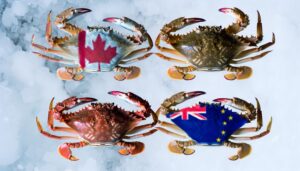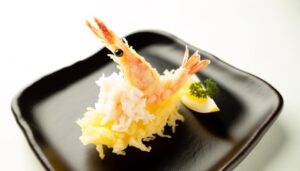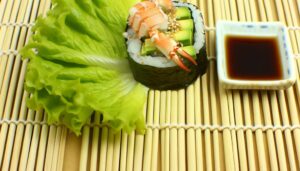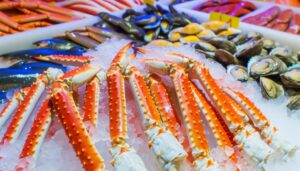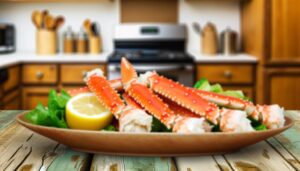How Can Dogs Eat Stone Crab Safely?
Yes, dogs can eat snow crab, but you need to make sure it's properly prepared and cooked. Snow crab is rich in protein, essential fats, and beneficial vitamins like B12.
It supports heart health and reduces inflammation due to its omega-3 fatty acids. However, watch out for potential allergies and avoid high sodium levels.
Always remove shell fragments to prevent choking risks. Give snow crab in moderation as an occasional treat and avoid any toxic seasonings.
Consulting your veterinarian for personalized advice is essential. Stay tuned to learn about proper preparation techniques and safe portion sizes for your dog's seafood treat.
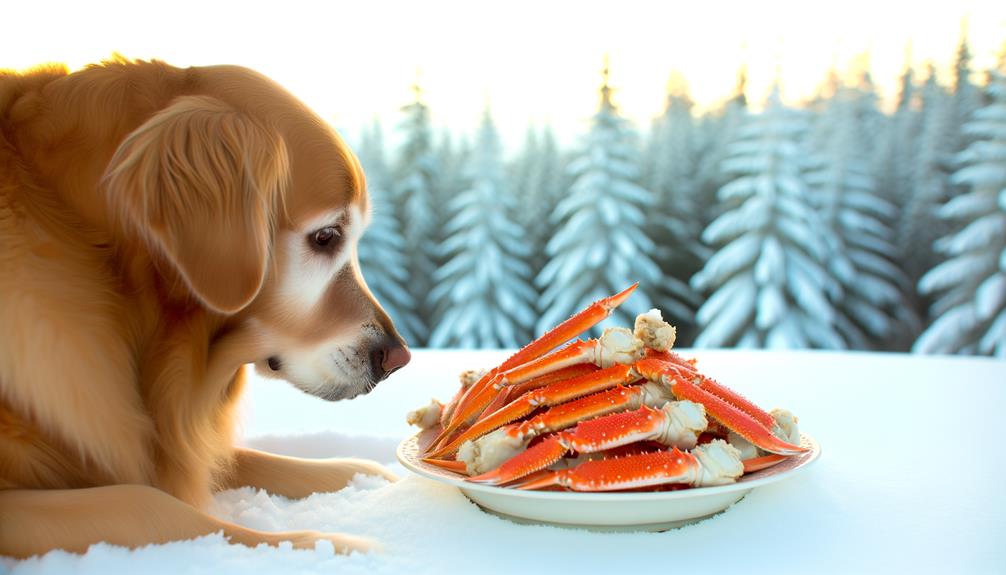
Key Takeaways
- Snow crab is rich in protein, omega-3 fatty acids, and essential vitamins beneficial for dogs.
- Remove all shell fragments and avoid adding seasonings to prevent choking and toxicity.
- High sodium content in snow crab can pose risks of hypernatremia; feed it sparingly.
- Consult a veterinarian before introducing snow crab to your dog's diet to avoid allergies.
- Ensure snow crab is thoroughly cooked and cut into small pieces for safe consumption.
Nutritional Value of Snow Crab
Snow crab is rich in high-quality protein, essential fats, and a variety of vitamins and minerals, making it a nutritious option for human consumption. Each serving provides substantial amounts of omega-3 fatty acids, which are essential for cardiovascular health.
In addition, snow crab is an excellent source of vitamin B12, aiding in the maintenance of nerve function and production of red blood cells. It also contains significant levels of selenium, a potent antioxidant that helps protect cells from damage. The presence of zinc supports immune function and wound healing.
Moreover, snow crab offers a low-calorie, low-fat profile, making it suitable for those managing their weight. This combination of nutrients underscores snow crab's value as a nutrient-dense food.
Health Benefits for Dogs
You'll find that snow crab can offer significant health benefits for your dog.
This nutrient-rich treat provides essential vitamins and minerals, along with omega-3 fatty acids that support heart health and reduce inflammation.
Including snow crab in your dog's diet can contribute to overall well-being when given in moderation.
Nutrient-Rich Treats
Frequently, incorporating nutrient-rich treats like snow crab into your dog's diet can offer significant health benefits, provided it's done in moderation. Snow crab meat is rich in essential nutrients such as protein, vitamins, and minerals. High-quality protein supports muscle maintenance and repair, while vitamins like B12 boost energy metabolism and neurological function. Essential minerals like zinc and selenium play pivotal roles in immune function and antioxidant defense.
However, it's important to monitor the portion size and make sure the crab is thoroughly cooked to avoid potential pathogens. Avoid added salts, seasonings, and shells, as they can be harmful. Integrating snow crab as an occasional treat can enhance your dog's nutritional intake, contributing to overall well-being.
Omega-3 Fatty Acids
Omega-3 fatty acids, mainly found in seafood like snow crab, are vital for your dog's cardiovascular health, cognitive function, and anti-inflammatory processes. These polyunsaturated fats help to lower triglyceride levels, thereby reducing risks of heart disease.
In addition, DHA, a type of Omega-3, supports neural development and cognitive function, which is particularly advantageous for aging dogs. The anti-inflammatory properties of Omega-3s can relieve symptoms of arthritis and other inflammatory conditions.
Including snow crab in your dog's diet can supplement these fatty acids, contributing to overall well-being. However, it's important to monitor portions and consult your veterinarian to maintain balanced nutrition, as excessive intake can lead to imbalances in other essential nutrients.
Potential Risks and Allergies
When determining if your dog can eat snow crab, it's vital to be aware of potential risks and allergies that could negatively impact your pet's health. Snow crab can trigger allergic responses in certain dogs, causing symptoms like itching, swelling, and gastrointestinal discomfort.
Moreover, the high sodium content in snow crab presents a risk of hypernatremia, which can lead to serious health issues such as dehydration and seizures. The presence of crab shells also poses a choking hazard or potential harm to your dog's digestive system.
Monitoring your pet for any negative reactions and seeking advice from your veterinarian before introducing snow crab into their diet is imperative. Prioritizing your dog's well-being guarantees a safer dietary option.
Preparing Snow Crab for Dogs
Given the potential risks and allergies associated with snow crab, it's important to prepare it properly to minimize harm and guarantee your dog's safety.
First, make sure the crab is thoroughly cooked, as raw seafood can harbor harmful pathogens. Boil or steam the crab without adding any seasonings, especially salt, garlic, or onions, which are toxic to dogs.
Next, remove all shell fragments meticulously, as these can cause choking or gastrointestinal injury. Cut the meat into small, manageable pieces to prevent choking hazards.
Portion Sizes and Frequency
To secure the health benefits of snow crab for your dog without overloading their system, limit portions to small, controlled amounts and offer it no more than once or twice a week. Portion control is essential to prevent digestive upset and nutrient imbalance. The table below provides a guideline for portion sizes based on your dog's weight:
| Dog Weight (lbs) | Snow Crab Portion Size (oz) |
|---|---|
| 10-20 | 0.5 – 1 |
| 21-40 | 1 – 2 |
| 41-60 | 2 – 3 |
| 61-80 | 3 – 4 |
| 81+ | 4 – 5 |
These recommendations secure your dog receives the nutritional benefits without excessive intake. Always monitor your dog's reaction to new foods and adjust portions accordingly.
Signs of Adverse Reactions
How can you tell if your dog is experiencing an adverse reaction to snow crab?
Look for symptoms such as vomiting, diarrhea, or excessive drooling. These gastrointestinal signs often indicate an intolerance or allergic reaction.
Monitor for skin issues like itching, redness, or hives, which signal a potential allergic response.
Respiratory symptoms such as coughing, wheezing, or difficulty breathing are more severe and require immediate veterinary attention.
Behavioral changes like lethargy or restlessness can also be indicators of discomfort or pain. Keep an eye on your dog's overall behavior and physical condition.
If you notice any of these signs, discontinue feeding snow crab and consult your veterinarian promptly for a thorough evaluation and appropriate treatment.
Alternative Seafood Options
You can consider safer fish types for dogs, such as salmon, whitefish, and herring. These alternatives provide nutritional benefits, including omega-3 fatty acids and essential proteins, supporting overall health.
Make sure you cook the fish thoroughly to eliminate any harmful bacteria or parasites.
Dog-Safe Fish Types
The inclusion of certain fish types in your dog's diet can offer a plethora of nutritional benefits, serving as excellent alternatives to traditional protein sources. Opt for low-mercury fish such as salmon, whitefish, and herring. These fish types are rich in omega-3 fatty acids, which support cognitive function and joint health.
Make sure the fish is thoroughly cooked to eliminate any harmful bacteria or parasites. Avoid fish with high mercury levels like swordfish and king mackerel, as they pose toxic risks. De-bone the fish meticulously to prevent choking hazards. Moderation is crucial; fish should complement a balanced diet rather than dominate it.
Consulting with a veterinarian before introducing new foods is always recommended for your dog's safety and well-being.
Nutritional Seafood Benefits
Incorporating alternative seafood options like snow crab into your dog's diet can provide essential nutrients while diversifying their protein sources. Snow crab is rich in omega-3 fatty acids, which support cardiovascular health and reduce inflammation. Additionally, it contains high-quality proteins that are essential for muscle maintenance and repair.
Snow crab also offers a good supply of vitamins and minerals, such as vitamin B12, zinc, and selenium, which are important for metabolic functions and immune support. However, always make sure the seafood is cooked and free from harmful additives or seasonings.
Moderation is key, as overconsumption of seafood can lead to nutrient imbalances. By varying the protein sources, you enhance your dog's overall nutrient profile and promote optimal health.
Expert Veterinary Opinions
Many veterinarians agree that while dogs can eat snow crab in moderation, there are specific risks and benefits to take into account. Snow crab is rich in protein and essential nutrients, which can support your dog's overall health. However, experts caution against feeding dogs any crab meat that contains added seasonings, butter, or sauces, as these can lead to gastrointestinal upset or even toxicity.
Another important consideration is the risk of shell fragments, which can cause choking or internal injuries. Always make sure the crab meat is thoroughly checked for shells and cooked properly to eliminate harmful bacteria.
Additionally, some dogs may have allergies to seafood, so introduce snow crab gradually and monitor for any adverse reactions.
Safe Treats for Dogs
Consider offering your dog a variety of safe treats to make sure a balanced and enjoyable diet. It's crucial to ensure the treats are nutritionally appropriate and free from harmful substances. Clinical evidence supports the following treats as safe and beneficial for dogs:
| Treat Type | Nutritional Benefit |
|---|---|
| Carrots | High in fiber, low in calories |
| Blueberries | Rich in antioxidants and vitamins |
| Cooked Chicken | High-quality protein source |
| Sweet Potatoes | Excellent source of dietary fiber and beta-carotene |
These treats can contribute positively to your dog's overall health while providing variety. Always introduce new treats gradually and monitor for any adverse reactions. Consult your veterinarian for personalized recommendations based on your dog's specific health needs.
Conclusion
To wrap up, although dogs can safely enjoy snow crab in moderation, it's crucial to monitor for any adverse reactions. You may be concerned about potential allergies, but by introducing small portions and observing your dog, you can decrease this risk.
Your dog's health is of utmost importance, and incorporating snow crab in a responsible manner can provide distinct nutritional advantages. Keep in mind to seek guidance from your veterinarian for tailored recommendations.
By prioritizing their welfare, you're demonstrating your dog the affection and attention they genuinely merit.

